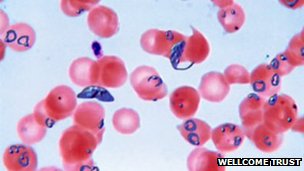New drug-resistant strains of the parasite that causes malaria have been identified by scientists.
Researchers found parasites in western Cambodia that are genetically different from other strains around the world.

These organisms are able to withstand treatment by artemisinin – a frontline drug in the fight against malaria.
Reports of drug resistance in the area first emerged in 2008. The problem has since spread to other parts of South East Asia.
The study is published in the journal Nature Genetics.
The lead author, Dr Olivo Miotto, of the University of Oxford and Mahidol University in Thailand, said: “All the most effective drugs that we have had in the last few decades have been one by one rendered useless by the remarkable ability of this parasite to mutate and develop resistance.
“Artemisinin right now works very well. It is the best weapon we have against the disease, and we need to keep it.”
Genetic fingerprint
Western Cambodia has been described by scientists as a hotspot for malaria resistance.
They do not understand why, but since the 1950s parasites there have developed a resistance to a succession of malaria drugs. The problem has spread to other parts of Asia and Africa.
Now scientists are worried the same thing will happen with artemisinin. This drug is used widely around the world against the mosquito-borne disease and can treat an infection in a few days when it is used in combination with other drugs.
To investigate, scientists sequenced the genomes of 800 malaria-causing parasites (Plasmodium falciparum) collected from around the world.
“When we compared the DNA of the parasites in Cambodia, they seem to have formed some new populations that we have not really seen elsewhere,” Dr Miotto said.
The international team found three distinct groups of drug-resistant parasites present in the area.
The researchers said they did not yet understand what genetic mutations had occurred that enabled the parasites to withstand artemisinin treatment.
But they said that understanding their genetic fingerprint would help them to quickly spot and track these strains if they spread further.
Dr Miotto said: “It could be a tool for detecting in real time the emergence of drug resistance.”
The World Health Organization has stated that a major objective is to stop the spread of malaria parasites resistant to drugs.
According to its latest estimates, there were about 219 million cases of malaria in 2010 and 660,000 deaths.
Africa is the most affected continent: about 90% of all malaria deaths occur there.





